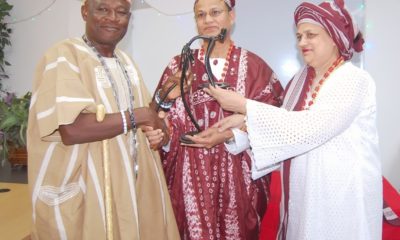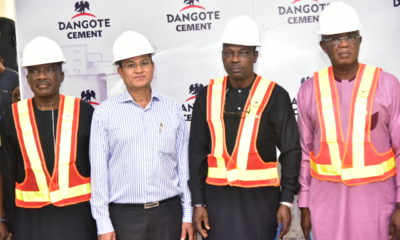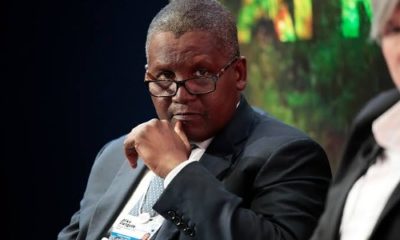Finance
Dangote Cement reaps dividend of African expansion, posts N74.7bn profit

LAGOS-Dangote Cement Plc has started reaping the benefit of its expansion across Africa, declaring a gross profit of N74.7 billion for the first three months ended 31st March 2015.
This indicates an increase of 10.5 percent over N67.63 billion recorded in the same period in 2014. According to the cement giant’s unaudited results for first quarter of 2015, revenues rose by 10.8 to114.7billion compared to N103.57 billion in the corresponding in 2014.
Alhaji Aliko Dangote noted that the improvement in the first results was buoyed by with maiden contributions from non-Nigerian factories. Net profit was up 44.1 percent to ¦ 68.6 billion in contrast to N47.62 billion in 2014 while earnings per share grew by 45.7 p
ercent to 4.09. Group cement sales volumes was up by 3.4 percent to 3.8 million tonnes driven by contributions from South Africa, Senegal, Cameroon and new lines in Nigeria.
The margins from Nigeria increased by new pricing, improved gas supply and more use of coal. Dangote Cement Plants are now operational in Zambia and Ethiopia. The new plants are expected to impact positively on the financials of the cement giants.
Speaking on the first quarter results, Chief Executive officer, Dangote Cement, Mr. Onne van der Weijde, said: “Our African projects are now beginning to deliver revenue growth for the Group and even at this early stage we are seeing good potential in all the countries into which we are expanding.
Senegal has made an excellent start, Cameroon is poised for a strong entry into an exciting growth market and Sephaku Cement is clearly shaking up the South African market as the first new entrant in many years. Although sales fell in Nigeria, we improved both revenues and margins thanks to pricing actions in December following the collapse of the oil price and currency devaluation.
We are making a significant investment to improve our logistical capabilities and I am pleased to report a much more favorable fuel supply in the first quarter of 2015. We have invested for growth in Africa and each new factory that opens will generate good returns for shareholders as we deliver on our promise to become Africa’s leading cement company.”
Dangote Cement is Africa’s leading cement producer with three plants in Nigeria and recently opened factories in South Africa, Senegal and Cameroon. It is a fully integrated quarry-to-customer producer with production capacity of 29 million tonnes in Nigeria at the end of 2014.
The Cement Obajana plant in Kogi state, Nigeria, is the largest in Africa with 13.25 million tonnes capacity across four lines. The Ibese plant in Ogun State has four cement lines with a combined installed capacity of 12 million tonnes. The Gboko plant in Benue state has 4 million tonnes capacity.
Vanguard-
Banking
CBN Denies Currency Devaluation

The Central Bank of Nigeria (CBN) has refuted claims of devaluing the.
Earlier reports suggested that the CBN had devalued the Naira, lowering its exchange rate from N631 to the dollar, compared to the previous day’s rate of N461.60 at the Importers and Exporters (I&E) window.
However, the Central Bank of Nigeria (CBN) released a statement on Thursday through its Acting Head of Corporate Communications, Dr. Isa Abdulmumin, categorizing the report as false information.
In the statement titled ‘CBN Has Not Devalued The Naira’, he said the attention of the apex bank was drawn to the news report by an Abuja based newspaper edition of June 1, 2023, titled “CB Devalues Naira To 630/51”.
However, the CBN stated categorically that the news report was replete with outright FALSEHOODS and destabilizing innuendos, ‘reflecting potentially willful ignorance of the said medium as to the workings of the Nigerian Foreign Exchange Market.’
“For the avoidance of doubt, the exchange rate at the Investors’ & Exporters (I&E) window traded this morning (June 1, 2023) at N465/USS1 and has been stable around this rate for a while.
“The public is hereby advised to ignore the news report by Daily Trust in its entirety, as it is speculative and calculated at causing panic in the market,” the CBN spokesman added.
He, therefore, advised media practitioners to verify their facts from the Central Bank of Nigeria before publishing in order not to misinform the public.
Banking
BREAKING: CBN Increases Interest Rate By 0.5%

The interest rate in Nigeria has been raised to 18.5 percent, up by 0.5 percent, from 18 percent where it was pegged in March 2023.
The Central Banks of Nigeria’s (CBN) Monetary Policy Committee (MPC) resolved to this effect at its third meeting of 2023 in Abuja, on Wednesday.
Governor, CBN, Godwin Emefiele, made the disclosure in the communiqué of the MPC’s meeting, thereafter.
While engaging the media at the end of the two-day meeting, Emefiele, said the committee voted to keep the asymmetric corridor at +100 and -700 basis points around the MPR.
In the view of the MPC, rising inflation rate is traceable to the high energy cost and challenges around the supply chain, among others, which lie outside the corridors of the CBN.
Emefiele said, “The current trend in price development would continue to be monitored by the bank with greater collaboration with fiscal authority to address the drivers of inflation.”
Biztellers reports that the CBN had effected six consecutive interest rate increases, which has seen the rate move from 11.5 percent in March 2022 to 18.5 percent in May 2023.
Finance
Dangers Lurk As Nigerians Resort To Refurbished Gas Cylinders

In Nigeria, people have been forced to come up with creative solutions to cope with the effects of inflation and the economic crisis.
These improvised strategies have not only helped individuals save money, but also enabled them to stay afloat during difficult times.
In a concerning development, the recent trend of boycotting the high cost of cooking gas cylinders in Nigeria may pose a greater risk to lives than it does in terms of saving money.
Economy&Lifestyle investigations have revealed that the soaring prices of gas cylinders have reached a point where it has become increasingly challenging for average households to afford them, let alone refill them with gas.
The situation is further exacerbated by the fact that the pump price of kerosene, which would typically serve as an alternative, has become prohibitively expensive.
Upon investigation, it was found that the prices of gas cylinders vary depending on their sizes. A 3kg gas cylinder is priced at N14,000, while a 5kg cylinder costs N16,000. The larger cylinders are even more costly, with a 6kg cylinder priced at N17,000 and a 12.5kg cylinder costing N19,000.
Additionally, the expense continues when it comes to filling these cylinders with cooking gas, as it costs N2,600 for a 3kg cylinder, N5,200 for a 6kg cylinder, N8,950 for a 10.5kg cylinder, and N10,650 for a 12.5kg cylinder.
Consequently, an average household that needs to replace a worn-out 5kg cylinder would have to come up with N20,250 to purchase a new cylinder and fill it with gas, which can be a difficult feat to achieve.
As a result, many people have resorted to refurbishing their old cylinders and trying to use them as best as they can. However, this approach poses a significant danger.
Mrs. Rukayat Adesoji, a trader, shared her experience regarding her gas cylinder, which had become rusted and could no longer stand upright since last month. Due to the exorbitant prices of purchasing new cylinders, she resorted to seeking the assistance of a welder.
The welder patched the legs of the cylinder, repainted it, and ever since then, she has been using the refurbished cylinder for her cooking needs.
She said ““My gas cylinder which was 6kg got rusted and no longer stands erect since last month. When I asked for the price, I was told it was N17, 500. I was discussing it with a friend who advised me to take it to a welder to paint it and construct a new stand. I heeded to her advice and at the end spent just N3, 000 to turn my cooking gas to a brand new.”
Apart from refurbishing cylinders, some people don’t even know when their cylinders will expire. Mrs. Mercy Opara, a hair stylist, falls in that category as she explained: “I am taking my gas cylinder to the welder to spray it for me. It just cost N1, 500.
“The cost of buying a new cylinder is high. I have been using my cylinder for over 7 years and I don’t even know the expiry date. I just pray God blesses me so that I can buy a new one. But this one I am managing will look neat after spraying it for another two years.”
Mr. Adekanbi Joseph, a wielder, said he paints cylinder and “To paint and rebuild a cylinder stand, I charge N4, 500. Many people come here to paint as a new cylinder is now very expensive to get.”
Highlighting the potential dangers of using refurbished cylinders, Mr. Benjamin Hope, the Chief Executive Officer of FKT Cooking gas and general goods, emphasized the risks involved.
He stated that even a brand new cylinder can pose a risk of explosion if the locks are not properly secured after use or if the cylinder filled with gas is moved from one location to another.
He said “A brand new cylinder can explode if the locks are not well keyed after using and if the cylinder filled with gas was moved from one place.
“There are many reasons for the high cost of gas cylinders in Nigeria. One is the cost of importation due to the exchange rate. Another is the increased migration from the use of kerosene to cooking gas which has necessitated increased demand for gas cylinders. You know that in such a case there will be increased importation of cylinders.”he added























